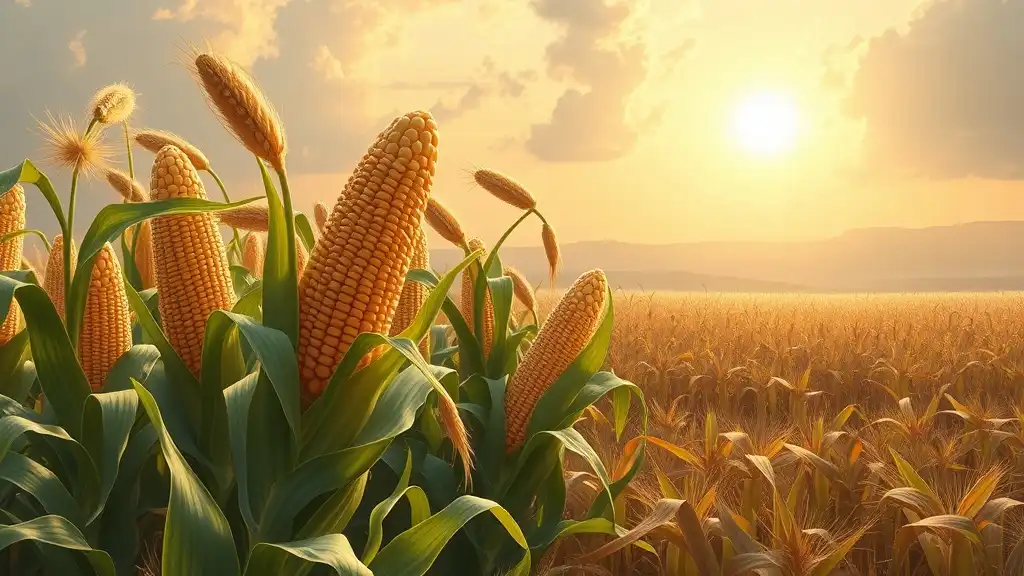Corn has long been a staple in many cultures, but its significance extends far beyond mere sustenance. In biblical texts, it serves as a powerful symbol of abundance, nourishment, and the divine relationship between God and humanity. Exploring the spiritual meaning of corn in the Bible reveals profound lessons that can enrich our understanding of faith, community, and gratitude.
The Symbolism of Corn in the Bible
Corn as a Sign of Abundance
In ancient biblical times, corn was a vital source of food, particularly in regions like Egypt and the Promised Land. Its presence in the scriptures often signifies God’s provision and blessings. The abundance of corn symbolizes the fruitful nature of God’s creation, showcasing how nurturing the land can yield bountiful harvests. This abundance is not solely material; it reflects a deeper spiritual wealth, suggesting that faith and reliance on God can lead to a richness of spirit and abundance in life.
Corn and Spiritual Nourishment
Beyond its physical attributes, corn also represents spiritual nourishment derived from the Word of God. In the parables, corn can be seen as a metaphor for the seeds of faith that, when sown in fertile hearts, grow into a robust spiritual life. The imagery of corn flourishing underscores the importance of absorbing divine teachings and letting them take root within us. It reinforces the message that just as corn provides nourishment to the body, so does the spiritual nourishment from scripture feed the soul.
Corn in Agricultural Practices
The process of planting, nurturing, and harvesting corn is rich with spiritual symbolism. It embodies the principles of growth and reaping—not just physically, but spiritually as well. In various biblical passages, the act of harvesting is celebrated, illustrating the joy associated with bringing forth fruit from one’s labor. This mirrored relationship teaches us about patience, faith, and the divine timing of our spiritual journeys. The cultivation of corn can remind us that, likewise, the fruits of our labors and faith will manifest at the right time.

Biblical References to Corn
Old Testament Mentions
Corn makes notable appearances in the Old Testament, particularly in the story of Joseph in the book of Genesis. Here, corn plays a crucial role in the survival of many during a time of famine, highlighting God’s providence. The abundant stores of corn symbolize hope and sustenance during times of distress, reinforcing the idea that divine care is available even in hardship. Additionally, in Psalms, corn is often linked with themes of prosperity and joy, enriching the spiritual landscape of the believer.
New Testament References
In the New Testament, corn appears in the parables shared by Jesus, often serving as a tool to convey deeper spiritual truths. In these teachings, the act of harvesting corn becomes a metaphor for spiritual growth and the gathering of souls into the Kingdom of God. The connections made between simple agricultural practices and profound spiritual principles reveal how accessible these teachings are for all, no matter one’s background.

Corn in Different Cultures and Traditions
Corn in Ancient Civilizations
Throughout history, corn has been revered in various ancient civilizations. Cultures such as the Mayans and Aztecs held corn sacred, seeing it as a gift from the gods. This widespread appreciation highlights the universality of corn as a life-giving force, transcending cultural boundaries. Spiritual teachings about corn emphasize the interconnectedness of creation, revealing that, like the diverse expressions of faith in different cultures, the essence of corn speaks to a universal truth about sustenance and life.
Corn in Modern Spiritual Practices
In contemporary spirituality, corn continues to embody transformational power. Many traditions incorporate corn into rituals, honoring its significance as a giver of life and energy. Practices such as corn offerings during harvest festivals serve to express gratitude for the sustenance received, forging a spiritual connection to the earth and its resources. These modern practices weave ancient wisdom into the fabric of today’s spiritual journeys, reminding followers of the blessings inherent in the world around them.

The Spiritual Lessons from Corn
The Cycle of Life and Death
The cycle of corn—planting, growth, harvest, and decay—mirrors the cyclical nature of life. Corn teaches us about the inevitability of death and rebirth, encouraging reflections on our own life cycles and the transitions we experience. This cyclical journey informs spiritual understanding that life is not linear but rather a series of seasons that lead to growth, especially during challenging periods.
Generosity and Sharing
Corn’s communal aspect, particularly in its harvest, emphasizes the values of generosity and sharing. The scripture encourages believers to share the blessings they receive, mirroring how corn nourishes many. This spirit of generosity fosters community, reinforcing the notion that spiritual growth is not just an individual pursuit but a collective journey. The act of sharing the fruits of one’s labor can lead to profound connections and strengthen communal bonds.
Gratitude for Harvest
Ultimately, corn serves as a poignant reminder to cultivate gratitude in our spiritual lives. Each harvest symbolizes a culmination of hard work, divine blessing, and the interconnectedness of all life. The practice of expressing gratitude—whether through prayer, community gatherings, or personal reflection—allows individuals to fully appreciate the gifts they receive. Recognizing the divine hand at work in our lives through the bounty of corn nurtures a spirit of thankfulness, evoking deeper spiritual fulfillment.

Conclusion
In exploring the spiritual meaning of corn within the Bible, we uncover a wellspring of wisdom that transcends time. From understanding abundance and spiritual nourishment to the cycles of life, corn’s symbolism continues to inspire a multifaceted view of our spiritual journeys. By reflecting on these teachings, we can deepen our relationships with both God and one another, nurturing a sense of gratitude for the many blessings that life provides.



















